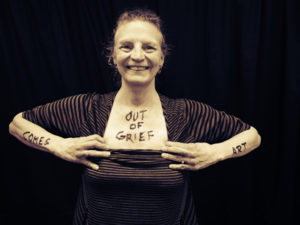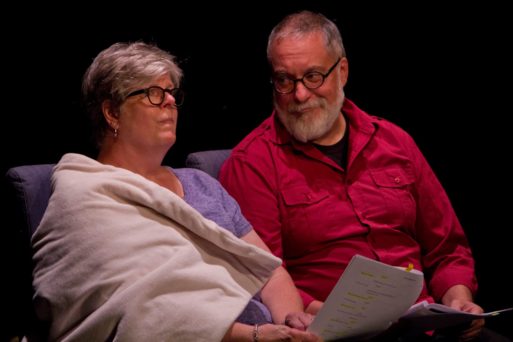This month, I had the pleasure of speaking with Elizabeth Coplan, the brain behind The Grief Dialogues, a non-profit artistic movement dedicated to creating new dialogue about death, dying and grief. The Grief Dialogues started as a live theater event that included an on stage follow-up discussion moderated by a grief counselor, to give people the chance to open up about their stories and ask questions.
Editors’ Note: This interview has been edited for length and readability.
Ellary Allis: Thanks so much for taking the time to speak with me! What is The Grief Dialogues?

Elizabeth Coplan
Elizabeth Coplan: The Grief Dialogues began as a live theater production that included six one-act plays woven together into a 70-minute long theater piece. It has evolved into a non-profit and an artistic movement to create new conversations around death and dying. Grief Dialogues is also part of the Positive Death Activist movement created by Megan Rosenbloom, who started the now international Death Salons — events that give people a place to dialogue about death and dying — and Caitlin Doughty, the well known mortician and author of “Smoke Gets In Your Eyes.”
Ellary: How did The Grief Dialogues get started?
Elizabeth: Three years ago I experienced a lot of deaths in my family and was pretty actively involved in their transitions. My family is, in general, very open about death. When my cousin Myra died of ovarian cancer, I was there for her final week. I was sad and trying to process, so I wrote a sort of essay to my family members who weren’t able to be there about the final days of Myra’s life. My family really liked that. I was already a writer, but that experience got me to start writing more about death and dying and grief.
Before her death, my cousin Myra had met a financial planner, who was taking care of her finances for quite a while. By the time she died, the financial planner had convinced her to do various things with her estate that I knew she would not have wanted if she’d been able to advocate for herself. I was really trying to process what happened, but it became a mess, with various family members being vilified by the financial planner. Eventually, I hired an attorney and went through mediation.
In mediation there’s a lot of downtime, so I sat there and I wrote a play based on Myra’s life, including what happened with the financial planner and her estate. The play was my way of trying to reconcile all that happened. I didn’t write it so that it would be preformed, I wrote it for myself. I didn’t know that it would see the light of day.
But I sent it off to the Island Theater Ten-Minute Play Festival on Bainbridge, Island, Washington, and it won a performance spot. Afterwards, people who had seen the play would come up to me saying, “That’s what happened to my mom,” or “That’s what happened to my sister.” They wanted to share their death stories. So I had the idea of putting out a call for submissions of one act plays that I could put together into a staged reading to open up dialogue about peoples’ death stories.
Ellary: What was the next step?
Elizabeth: I was in La Jolla, California for the Dramatists Guild National Conference. I presented the idea of sending out a call for submissions for one act plays dealing with death and grief to some playwrights there, some very prominent, and they loved the idea! So I did, and playwrights were sending me all of this fabulous material. After compiling those scripts, I realized that I had plenty of dying mom stories but not a lot of dying baby, sibling, or any of the many other scenarios that can happen. I realized that what I wanted was to weave six short plays about various aspects of dying/death and/or grief into a performance. I also wanted to moderate a discussion after the play was over with a grief counselor on stage, to give people space to be able to a ask their questions. I didn’t want to send them off to drive home after this emotional and possibly triggering experience. I wanted to be able to hold space for dialogue when the play was over.

A scene from The Grief Dialogues performace
Credit: seattleartists.com
Ellary: How did you choose which plays to produce?
Elizabeth Coplan: Well, I received over 120 submissions, and narrowed them down to 80 at first. I sent those plays to to an advisory counsel and gave them a survey, as objective as possible, to fill out about each play. They narrowed it down to 20. Ultimately I wanted 12, so then I then sent those 20 plays to a grief counselor, a funeral director and a theater director and asked them to evaluate them based on their expertise. They narrowed it down to 12, so then I sat down and figured out which plays I wanted to do first and which plays I would combine so that I had a little bit of everything in the performance.
Ellary: Tell us about the world premier of the “The Grief Dialogues” play?
Elizabeth: We had our opening on September 8th at a Seattle Death Salon in Seattle. I had met Caitlin Doughty, who wrote “Smoke Gets in Your Eyes,” years prior, and she had introduced me to Megan Rosenbloom, the director of Death Salon. I asked her if she would consider having one in Seattle. She said she’d love to, but didn’t have anyone on the ground who could make it happen. So I volunteered because I’d been event planning for 40 years, in my PR and Marketing career. So I partnered with the University of Washington School of Social Work to host this event, where “The Grief Dialogues” would have its world premier.
The Co-op Funeral Home of the People’s Memorial, the largest funeral co-op in the world, signed on as a sponsor, as did the Ernest Becker Foundation. The night of the premier we filled a 160-seat theater. The transition between each play is a poem that helps intertwine everything. Nothing is done to be a one off, the entire performance flows as one. With the play and the traditional poetry, the performance ran 70 minutes. We had such a great reception to the performance and the discussion afterwards, where people shared their death stories with us and one another.
Please check back next week as we conclude our conversation with Elizabeth Coplan about The Grief Dialogues, its impact, and things she’s learned along the way.

 What is The Grief Dialogues?
What is The Grief Dialogues?


 Recovering Cremation Remains After the Los Angeles Fires
Recovering Cremation Remains After the Los Angeles Fires
 “As Tears Go By” by Marianne Faithfull
“As Tears Go By” by Marianne Faithfull
 “The Sea” by John Banville
“The Sea” by John Banville














